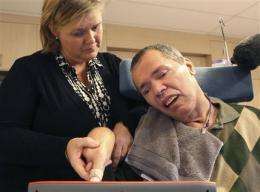Comatose for 23 years, Belgian feels reborn

(AP) -- Helped by a therapist, Rom Houben's outstretched finger tapped with surprising speed on a computer touchscreen, spelling out how he felt "alone, lonely, frustrated" in the 23 years he was trapped inside a paralyzed body.
After a doctor found he was wrongly diagnosed as being in a vegetative state, and worked out a way for him to communicate, Houben said he now feels reborn.
"And just like with a baby, it happens with a lot of stumbling," the 46-year-old Belgian wrote, tapping out the words in Dutch for Associated Press Television News on Tuesday as an aide guided his hand.
A leading bioethicist, however, expressed skepticism that Houben was really communicating, saying the responses seem unnatural for someone with such a profound injury and an inability to communicate for decades.
Injured in a car crash in 1983 when he was 20, Houbon was diagnosed as being in a vegetative state, though doctors now believe he was conscious the whole time.
An expert using a specialized type of brain scan that was not available in the 1980s says he finally realized Houben was suffering from a form of "locked-in syndrome," in which people are unable to speak or move but can think and reason, and provided him with the equipment to communicate.
Now, assisted by a speech therapist who moved his finger letter-by-letter along a touch-screen keyboard, Houben says years of being unable to move or express himself left him feeling "alone, lonely, frustrated, but also blessed with my family."
"It was especially frustrating when my family needed me," wrote Houben, who says he heard his father died during that time, but was unable to show any emotion. "I could not share in their sorrow. We could not give each other support."
"Just imagine. You hear, see, feel and think but no one can see that. You undergo things. You cannot participate in life," he wrote.
The therapist, Linda Wouters, told APTN that she can feel Houben guiding her hand with gentle pressure from his fingers, and that she feels him objecting when she moves his hand toward an incorrect letter.
Despite the occasional typo, the responses seemed fluid and conversational Tuesday. Suffering from a cold, he opened the interview by typing out, with the help of his therapist: "You catch me at a bad moment, I have looked better."
Dr. Steven Laureys of Belgium's Coma Science Group, whose testing uncovered Houben's misdiagnosis three years ago, says he has discovered some degree of consciousness using state-of-the-art equipment like PET scans on other patients and looks at about 50 cases from around the world a year.
But none are as extreme as that of Houben, who was fully conscious inside a paralyzed body. Many center on the fine distinction between a vegetative state and minimal consciousness.
Arthur Caplan, a bioethics professor at the University of Pennsylvania who has had no direct contact with Houben or personal knowledge of the case, said he is skeptical of Houben's ability to communicate after seeing video of his hand being moved along the keyboard.
"That's called 'facilitated communication,'" Caplan said. "That is Ouija board stuff. It's been discredited time and time again. When people look at it, it's usually the person doing the pointing who's doing the messages, not the person they claim they are helping."
Houben's mother, Fina, told the AP her son has been communicating for three years and she believes no one is guiding him.
"At first he had to push with his foot on a sort of computer mouse which only had a yes-no side," she said in a telephone interview. "Slowly he got better and developed through a language computer and now communicates with this speech therapist holding his hand."
Dr. James Bernat of Dartmouth Medical School said he could not comment on the facts of Houben's case specifically. However, he called Laureys "a very rigorous scientist and physician ... one of the world's leaders" in the field of brain imaging in people with consciousness disorders.
Houben's mother said her son has become so proficient at punching sentences that he has even started writing a book. He has also written an article titled "Hidden wealth ... the force of silence" for the in-house magazine at the 't Weyerke institute in eastern Belgian where he is being treated.
Asked Tuesday how he felt when his consciousness was discovered, Houben tapped out rapidly with the help of his aide: "I especially felt relief. Finally...able to show that I was indeed there."
Laureys said he is now re-examining dozens of other cases. In a recent study, 40 percent of the patients diagnosed as being in a vegetative state were in fact minimally conscious.
American experts acknowledged a vegetative state diagnosis can often be wrong. But in most cases, they said, it involves a patient who is minimally conscious, whose muted and intermittent signs of awareness might be overlooked, rather than a patient like Houben, who is fully conscious but paralyzed.
Experts blamed the difficulty of diagnosis, insufficient training of doctors and a lack of follow-up to look for subtle signs that a once-vegetative patient has actually improved.
"Many people recover over time," said Dr. Joseph J. Fins of the Weill Cornell Medical College. "It's very easy for the label that is affixed at one point to sort of become eternalized, and so no one questions the diagnosis."
©2009 The Associated Press. All rights reserved. This material may not be published, broadcast, rewritten or redistributed.
















